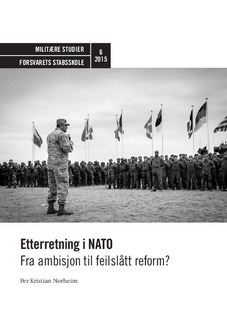Etterretning i NATO. Fra ambisjon til feilslått reform?
Research report
Permanent lenke
http://hdl.handle.net/11250/2366847Utgivelsesdato
2015Metadata
Vis full innførselSamlinger
- Militære studier [18]
Sammendrag
This thesis explores the motivational origins of NATO’s Knowledge Development (KD) concept. Given its degree of implementation in the alliance command structure, KD might or might not have led to enhanced military decisionmaking at NATO’s operational and strategic levels. The findings suggest that KD was conceived as a way of meeting the challenges experienced in the NATO operations in the Balkans and Afghanistan. The alliance needed a combined, civil-military effort to crisis management. Recognizing the operational lack of coordination, NATO adopted the so-called Comprehensive Approach. As part of this whole nation approach, KD was designed to increase the limitations of traditional military intelligence when it comes to decision-making support. The thesis regards KD as a conceptual innovation, imbued with the ambition of reforming NATO’s information domain. Due to economic and strategic shortcomings, however, the member states didn’t wholeheartedly support its formal implementation. Nevertheless, parts of the KD concept have found their way into the command structure. Both at the strategic level (SHAPE) and the operational level (JFC Brunssum), KD seems to have enabled a more holistic, situational understanding, and thus to a certain extent has reformed and improved decision-making within NATO. However, the basic challenges of international cooperation remain. Most likely, the ambitions behind Comprehensive Approach and KD have been too high. NATO’s contribution to crisis management will still be dependent on, and hampered by, its military instruments of power. The member nations will continue to control intelligence and limit information sharing. Rather than focusing on conceptual reforms, it seems that future development will be characterized by pragmatic, individually tailored solutions.
